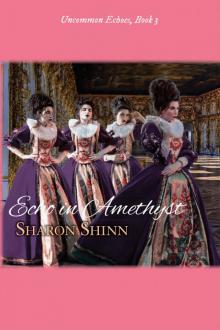- Home
- Sharon Shinn
Echo in Onyx Page 18
Echo in Onyx Read online
Page 18
The meal seemed to last forever, and the evening was far from over. Prince Cormac came to his feet as it ended and invited everyone to follow him to the music room to hear some harpers considered the best in the Sammerly province. So we had a colorful parade through the halls—close to one hundred bodies jostling along as groups of three and four tried to stay together without stepping on anyone else’s toes—but no one seemed to be anxious about the maneuver except me. And Marguerite, I supposed. I saw her glance over her shoulder a couple of times as if making sure I was still behind her. Of course, I never met her eyes, since I was glancing over my shoulder at the same time.
The ethereal, gliding sounds of harp music floated into the corridor, drawing us all in through a wide, arched doorway. Three slim young men sat on a low dais, practically embracing their instruments as they reached out to strum the stretched golden strings. Like the dining hall, the music room was spacious and arranged for guests with echoes. Clusters of chairs and sofas were surrounded by concentric rings of additional seating options that weren’t quite as plush. The Banchura triplets commandeered a whole section of the room, joined by Lady Darrily and a couple of young lords whom we hadn’t met yet. I saw Elyssa and her echoes trap Jordan in a corner of the room, and I had to discipline a smile.
Marguerite was glancing around for a place to sit when Prince Cormac approached and placed his hand on her arm. Through the fabric of my dress, I felt one of his echoes lay his fingers on my sleeve. His touch was much warmer and weightier than the touch of the Banchura echo.
“Come sit with me, onyx lady, and tell me about your journey,” the prince invited.
“I’d be happy to,” she said, and we all took our places in one of the clusters of chairs. Everyone in the room seemed to assume that Cormac didn’t want to be interrupted because no one approached us for the next fifteen minutes.
If Marguerite was uneasy at being drawn into a private conversation with the prince, she didn’t show it. She leaned back against her chair, seeming entirely relaxed, and she bestowed a friendly smile on the prince. Well—I was behind her, so I couldn’t watch her face, but I saw Patience smiling through her veil, and I copied the expression.
“We were on the road nearly a week, which is the longest I’ve ever been in a coach,” Marguerite said. “I don’t know how people can bear it when they must travel all the time! Peddlers or couriers or merchants with businesses all over the realm. I found it exhausting.”
“Yes, but if you never travel anywhere, you develop skewed notions about life,” Cormac replied. “You think everyone looks like you or thinks like you, and you grow very comfortable with the notion that the world is a certain way. And then you find out that it’s not, and it’s likely to be an unpleasant discovery.”
It was a piece of philosophy I happened to agree with. I hadn’t traveled much until recently, but I’d certainly met my share of strangers from distant places whose attitudes and experiences in no way tallied with my own. Cormac was right that the interactions had been bewildering—but instructive.
“Having made the trip, I am quite determined to benefit from it!” Marguerite replied. “What places should I visit in Camarria that will give me another view of the world?”
“There are the markets, with merchandise from throughout the Seven Jewels and from countries across the sea. There are the ruins in the northern part of the city—the remains of buildings that were built by King Edwin, if our historians are to be believed. And, of course, there are the lords and ladies gathered in this room who will tell you stories about their daily lives that are much different from your own! You can learn something from each of these.”
As he made that last observation, he gestured lightly toward those assembled lords and ladies. All of them appeared to be engaged in their own conversations, but I was pretty sure they were surreptitiously keeping their eyes on Cormac and Marguerite, wondering if the gossip was accurate. Is it true? Will she be the one to marry the prince? I imagined they wouldn’t miss a single expression on her face—or his.
“There’s one thing that I think must be the same from one end of the kingdom to the other,” said Marguerite. “The presence of the triple goddess.”
If I hadn’t been trying to precisely mimic Marguerite’s every move, my head would have jerked around at those words and my eyebrows would have shot up to my hairline. Marguerite hadn’t mentioned the goddess since we set out on this trip. She hadn’t even seemed to notice the temples we passed as we rode in this afternoon.
“Oh, yes, she is very much revered here in the royal city,” said Cormac. “In fact, the oldest temple dedicated to the triple goddess is to be found in Camarria.”
“I would like to visit it someday.”
“Then we shall plan an expedition. What else would you like to see?”
“What else should I make sure not to miss?”
They talked sightseeing for the next few minutes, until a young man and his two echoes sauntered over. I thought I recognized him as one of the nobles who had accompanied Cormac on the visit to Orenza. “Do you mean to monopolize Marguerite’s attention for the entire evening?” he demanded. “Surely you should be mingling with all your guests, not playing favorites.”
“I scarcely need you to criticize my behavior,” Cormac replied, but in a good-natured way. “Besides, I was very gracious to everyone else yesterday when Marguerite wasn’t here.”
“Yes, that’s my point exactly,” his friend replied. “Marguerite wasn’t here! And I have had no chance to talk to her! Won’t you come sit with me by the stage so we can enjoy the music? It seems pointless to pay so much money to hire the most accomplished harpists in the province and then ignore them completely.”
Marguerite glanced at Cormac, but he made a dismissive gesture. “Fine, go sit with Nigel! Otherwise he’ll be intolerable for a week at least.”
Marguerite stood up and bobbed a quick curtsey, actions that her echoes and I repeated. “I do want to hear the music,” she said, “but I’ve greatly enjoyed our conversation.”
“We shall have many more opportunities to talk,” he promised her.
The seven of us wound through the crowded room to take up places much nearer the dais, though Nigel had to roust out a few of his friends to open up enough chairs for all of us. Once we were seated, Nigel pulled his chair close to Marguerite’s and began whispering a commentary in her ear. His two echoes similarly bent close to Patience and Purpose, their lips so close to the women’s faces that I almost expected them to press kisses against their cheeks. I had no echo to interact with, but I took up the same pose as Patience and Purpose, my body tilted toward an unseen presence, my face half-turned toward my missing companion. It might have been the oddest moment in an altogether odd evening.
And an altogether long evening. I hoped we were done when the music stopped, but no, that was just the signal for servants to return, carrying trays of wine and other refreshments. People drifted and shifted across the room, holding their drinks and exchanging lighthearted banter, before moving on to another friend, another conversation, another glass of wine.
It was the most pointless hour of my entire existence. These people did nothing useful with their time. I accepted that they weren’t part of the laboring class who dedicated their lives to useful occupation—they didn’t farm the land or work the mines or tend the livestock; they didn’t cook, sew, garden, or clean—but I had thought they would at least engage in intellectual pursuits. Surely, if they had come together for no purpose but conversation, they would discuss politics, debate reforms, or dissect scientific papers published by the local scholars. But they did none of that. Instead they complained about the tedium of travel, they complimented each other on their clothing, they flirted, and they drank wine. And they all seemed perfectly happy not to force their brains to contend with anything more taxing.
Just from the incessant smiling and the staggering inanity, I was developing a massive headache. The wine didn’t help, either. I
had never in my life been so happy to see an evening come to an end.
The Banchura sisters were the first ones to make their goodbyes and slip from the room, leaving it noticeably emptier. Marguerite waited until another four or five guests had exited before she, too, headed for the door. I understood her logic; she did not want to call attention to herself by leaving too early or lingering too late. But if it had been up to me, we would have left even before the triplets did.
Just in case anyone happened to be watching us, we maintained our guise of mistress and echoes for the entire trek from the music salon to Marguerite’s chambers. But as soon as we were safely in her room with the door shut behind us, the four of us practically fell apart. Marguerite cast herself into a chair, her head thrown back and her arm covering her eyes, while I dropped to a footstool and bent my head over my knees as if to fight off nausea. Patience and Purpose, released from Marguerite’s control, just sat side by side on one of the sofas, their hands in their laps and their heads drooping with exhaustion.
“We have how many days here?” I demanded when I finally sat up again. Not until this moment did I pull off my headpiece with its gauzy veil. Finally I could see the world clearly again.
“Too many,” Marguerite said faintly. “Hundreds. A lifetime.”
“No, really. A month? I don’t think I can bear it.”
She sat up, smoothing back a lock of hair and rearranging her skirts. “No, but you were wonderful tonight! I mean, I could only get glimpses of you because you were usually behind me, but you were always so perfectly in tune. I actually forgot, from time to time, what a dangerous game we are playing.”
“You should never forget that,” I said soberly. “But I do think we pulled it off well enough, this first night at least. There will be plenty of new tests ahead.”
Marguerite flopped back against the chair. “Yes! Because—I never thought of this until tonight—but there will be a ball at least once a week while we’re here. And if you don’t know the dances—well, I suppose I can say I’ve twisted my ankle or bruised my foot.”
I smiled tiredly. “Oh, but I do know the dances. Most of them anyway.”
“Truly? You can dance? You are a woman of infinite surprises.”
I explained about the dancing instructor who had paid for her stay at the Barking Dog by giving lessons, and added, “But I might be a little rusty. We might want to practice here in your room before the first ball.”
“Sometime in the next day or two,” she promised. “Right now I’m too tired.”
I came to my feet. “Let’s get you ready for bed, then I’ll go up to my room.”
She and the echoes had also stood up, but at this she looked worried and uncertain. “Shouldn’t you stay here? With me? In case one of the maids comes in to bring water or clean the room?”
I had already given this some thought. “Just keep your door locked and refuse to let anyone in. We need to establish you early on as an eccentric who doesn’t like to be waited on by unfamiliar servants. I’ll find a way to let Lourdes know that you only open the door when I’m in the room.”
“I suppose that will work,” she said doubtfully.
I managed to summon a tired smile. “You can get away with being a little odd. I can’t,” I pointed out. “If I’m not back in my room regularly, people are going to notice and comment on it.”
Marguerite’s face grew even more anxious. “But they’ll notice if you never go downstairs to take meals with the other servants, either. And since you’ll always be in the dining hall with me—”
“It will be tricky,” I admitted. “Maybe some evenings you’ll retire early to your suite and I can eat in the servants’ hall. Or I’ll make arrangements with the cook to swing by the kitchen after hours to pick up cold meals. Among the servants, we will paint you as fretful and demanding, always requiring my attendance, never allowing me a moment to myself.” I shrugged. “It should work, though you will be viewed with some scorn.”
“Better than being viewed as a murderer, I suppose,” she said.
“Don’t talk like that.”
“I know. It does no good. It’s just that—”
I came close enough to put my hands on her shoulders and give her a little squeeze. Shockingly familiar, I know, but she seemed to need the encouragement. “We can’t change what happened. We can only go forward as best we know how. We will get through this. We will.”
She nodded, took a deep breath, and attempted a smile. “I suppose I will feel more hopeful in the morning,” she said.
“I’m sure you will.”
Soon enough I had gotten her ready for bed, though I couldn’t tuck her in for the night because she had to lock the door behind me. I was so tired that I staggered a little as I climbed the stairs to my quarters and I had to pause twice to remember the way. But finally I was in my own small space, with my own door and my own lock. Alone for the first time all day.
I leaned briefly against the door just to gather enough energy to step deeper into the room and unpack my trunk. Not until I had hung up my clothes and washed my face did I turn to the bed and prepare to pull back the covers.
That was when I spotted the small floral offering resting upon my pillow. A single white rose veined with the faintest pink. A man might have to search the entire city to locate that specific blossom at this time of year, might have to pay a small fortune to acquire it.
I blew out my candle, climbed into bed, pulled the covers up to my chin, and laid the smooth petals of the rose against my exposed cheek. Either Nico had bribed one of the palace servants to place this flower in my room—in which case at least one other person and probably every other member of the household staff knew that I had caught his eye—or he had the resources to discover which room was mine and the key to unlock this door. I couldn’t decide which possibility was more alarming.
I didn’t have the energy to worry about it. I closed my eyes and fell asleep within minutes, the rose still breathing its satin spell upon my skin.
CHAPTER FOURTEEN
“I want to go to the temple,” Marguerite said.
I had been astonished, upon entering her room the next morning, to find her completely dressed, though she was wearing a simple gown and had barely bothered to style her hair. Patience and Purpose were similarly attired. But that astonishment was nothing compared to what I felt now.
“What temple?” I asked with a sense of foreboding.
“The one Cormac talked about last night. The old one.”
“Why?”
She gave me a frosty look. “Why does anyone visit a temple? To seek the guidance of the goddess.”
It was insubordinate, but I couldn’t help my retort. “That’s not why you generally go.”
She flushed but didn’t reprimand me, just lifted her chin in a defiant way. “Quickly. Before the other women start leaving their rooms. I believe they’re all going off on some shopping expedition this morning, but I said I didn’t want to go. But I don’t want them to see me in the hallway and try to make me change my mind.”
Wondering wildly, but not willing to argue about it, I reached for the door. “All right. Let’s go.”
“Brianna,” she hissed. “You have to change.”
Now it was my turn to flush. One night of deep sleep and I had almost forgotten the role I had to play. “Of course. I’m sorry. Give me a minute. I—” I shook my head and scurried past her to root through the echoes’ closet. It was a matter of a few minutes to swap my servant’s clothing for an echo’s dress and don a veiled headpiece that covered most of my hair. I kept my own shoes, since I assumed we would be walking some distance and Prudence’s feet were just a little smaller than mine.
“Do you remember the way out?” I asked as Marguerite led us through the door. She merely nodded and set off down the hall.
I was not surprised, as we made it downstairs and began crossing the grand foyer, to find Lourdes there ahead of us. She struck me as the kind of person who almos
t never slept. Try to sneak through the halls at midnight to carry out some questionable errand, and you’d find her there before you, dusting the woodwork or checking the locks on the silver cabinet.
She glided up to us and offered a majestic curtsey. “Lady Marguerite,” she said. “You’re awake early. Is there something you need?”
“Good morning, Lourdes,” Marguerite replied, proving the housekeeper was not the only one who could remember names. Her voice was a little plaintive, which I quickly realized was by design. “I woke with one of my headaches, and I thought a short walk might chase away the pain. It often does.”
“I’m sorry to hear it. I could send someone for an apothecary.”
“Perhaps later, if the exercise doesn’t clear it up. Thank you.” Marguerite turned to go—and then, as if suddenly remembering something, turned back. “Last night. The prince mentioned a temple nearby. I thought I might walk there, if it isn’t too far.”
“An excellent idea, my lady, and it’s not far at all. Shall I have a footman escort you there?” I saw Lourdes’s gaze briefly take in the echoes and look beyond us. “Since you seem to be planning to go out without your maid.”
Marguerite didn’t hesitate. “She’s busy repairing the damage a few of my dresses sustained in transit,” she said.
“I see.”
“But I’ll happily accept the attendance of a footman if you have one to spare.”
A few moments later, a fresh-faced young boy in royal livery was leading us out through that magnificent palace courtyard. The place was already bustling with tradesmen who had probably been up even before Lourdes. Working folk were always at their jobs before the sun rose.
The footman helpfully pointed out key landmarks to Marguerite as we strolled down the wide streets. Maybe half of the buildings we passed were the same red brick as the palace, though none of them featured the verdigris roof; another quarter were white stone, and the rest were constructed of a wide variety of materials, from wood to plaster. I was impressed by how tidy everything looked. Back in Oberton, the governor employed a whole army of street sweepers, but Camarria was so clean that I thought King Harold must deploy street scrubbers. As with the palace itself, these buildings all showed evidence of great activity on the ground level, where servants and merchants were already at work, but all was quiet and curtained on the upper levels, where the wealthy and the idle still slumbered.

 Jenna Starborn
Jenna Starborn Troubled Waters
Troubled Waters The Thirteenth House
The Thirteenth House Reader and Raelynx
Reader and Raelynx Angel-Seeker
Angel-Seeker Archangel
Archangel Jeweled Fire
Jeweled Fire Nocturne
Nocturne The Shape-Changer's Wife
The Shape-Changer's Wife Still Life With Shape-Shifter
Still Life With Shape-Shifter Quatrain
Quatrain Fortune and Fate
Fortune and Fate Angelica
Angelica Summers at Castle Auburn
Summers at Castle Auburn Echo in Amethyst
Echo in Amethyst The Turning Season
The Turning Season Mystic and Rider
Mystic and Rider Heart of Gold
Heart of Gold The Shape of Desire
The Shape of Desire Echo in Onyx
Echo in Onyx Royal Airs
Royal Airs Gateway
Gateway The Safe-Keeper's Secret
The Safe-Keeper's Secret Wrapt in Crystal
Wrapt in Crystal Unquiet Land
Unquiet Land Jovah's Angel
Jovah's Angel Dark Moon Defender (Twelve Houses)
Dark Moon Defender (Twelve Houses) Mystic and Rider (Twelve Houses)
Mystic and Rider (Twelve Houses) Fortune and Fate (Twelve Houses)
Fortune and Fate (Twelve Houses) Reader and Raelynx (Twelve Houses)
Reader and Raelynx (Twelve Houses)